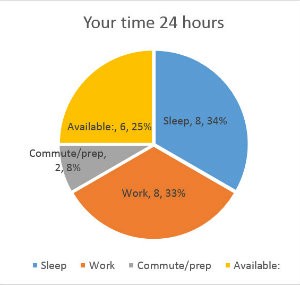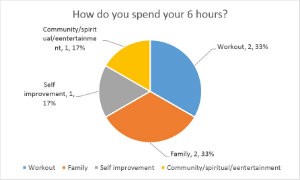Time
 I was listening to podcasts last weekend as I was moving a few tons of snow. Much to my surprise Peter Herridge was talking about me and said “I don’t know how Chris gets all the stuff done that he does.” The surprising part wasn’t that Peter was talking about me, we share ideas, but that I have some unique ability to accomplish work.
I was listening to podcasts last weekend as I was moving a few tons of snow. Much to my surprise Peter Herridge was talking about me and said “I don’t know how Chris gets all the stuff done that he does.” The surprising part wasn’t that Peter was talking about me, we share ideas, but that I have some unique ability to accomplish work.
If you were to read my school transcripts you’d find that my teachers consistently said “He could do so much better, if he only applied himself.” I’m not one of the super hard working people with a singular focus. You know the kind of people I mean. They move mountains. They start foundations. They change history. Not me, I’m mostly along for the ride.
That being said, I do find time to do the things I want to do, and I do have strategies to get the time to do it. It’s not true that I have some special ability. But, it is true that I understand the rules around time management, the nature of it and how to work within those constraints.
How much time to you have in your day? I’ve got 24 hours. The game now becomes how to use those 24 hours.
I would propose you try the following exercise. Figure out what you do with your 24 hours. It’s not as hard as you think because if you are like most people your 24 hours consists of some large, definable chunks.
Let’s say you have a job. In the Western worldview a job takes 8 hours out of your day. That’s a 3rd of your available time. Suppose you live 20 miles from work and have to fight traffic to get to your job. Suppose you’re considerate enough to shower and shave and maybe have breakfast. Let’s say all that stuff takes another 2 hours coming and going. It’s really 10 hours, or more than a 3rd of your day.
What else is another big chunk of time? Sleeping. I like to sleep 8 hours a night. Sometimes circumstance forces me to cut that short, but I’m not the type of person that can live on 5 hours of sleep. It’s not healthy for me. Sleeping less to get more time is unhealthy. Don’t steal from the sleep time bucket.
 Out of our 24 available hours we have 10 for work and 8 for sleep. That means there’s only 6 left over for everything else. If you take this structure as fixed that means everything else has to be fit into this 6 hours. Meal preparation, exercise, making love, watching movies, reading books…all of it.
Out of our 24 available hours we have 10 for work and 8 for sleep. That means there’s only 6 left over for everything else. If you take this structure as fixed that means everything else has to be fit into this 6 hours. Meal preparation, exercise, making love, watching movies, reading books…all of it.
You see how it’s like a puzzle or a game of Tetris, where you’re constantly trying to fit blocks of time together in a way that is most efficient and effective? This mental Tetris game with your time is not a solvable problem because you have, as they say in operations research, “over-constrained the problem”.
If you really want to get everything done you have to unconstrain the problem. You have to realize that, ok, maybe you need 8 hours of sleep but there’s no reason you have to set aside another 10 hours for work. You have to look at it as a 24 hour problem, not a ‘free time’ problem.
If you want to take one nugget away from this thought it is simply this: You’ve got a 24 hour opportunity, not a time problem.
If your work life is taking up 1/3 of you time how do you set it up so you access some of that work time and use it to get other things done?
I’m not talking about stealing time from your employer. I’ll let you in on a revelation. Your employer doesn’t want your time. Your employer wants the results that you produce by spending your time. The only reason they care about time is that it is the only thing they can measure.
I remember working in Japan. Culturally the office workers were expected to come in early and stay late. Sure, everyone was in the office 12-14 hours a day but did they really get more work done? No. They probably got less done because they over-constrained the time problem.
Here are some strategies for you to access that work time.
First, don’t put yourself into a job where you trade time for money. Any job where you have to punch a clock or be visible at a task for 8 hours is going to constrain you to that job. Move yourself into a position where you are responsible for delivering results, not hours.
If you’re trading time for money and you figure out a way to be more efficient (i.e. save time) you don’t get that time back in a time-for-money-job, your employer does. If you figure out a way to be more effective (i.e. do more with less) you don’t benefit from that effectiveness in a time-for-money-job, your employer does.
If you can position yourself in a results based job, on the other hand, you get the benefit of any effectiveness and efficiency you can come up with. That’s going to give you more time overall to play with in your life. As long as you get the work done, and deliver to expectations no one is going to care if you’re playing golf at lunch or taking a conference call from the beach.
Which is my second point. When you get to the results based job you can start to blur the hard lines between work time and your time. This makes the optimization problem less constrained and allows you to be more efficient. If you have a big project to deliver, maybe it’s more efficient for you to work on that at night or on a plane instead of at your desk.
I’m going to put you to sleep here but feel free to follow up with the Operation s Research Department at MIT or Cal Tech. If you can blur the lines you can essentially double the size of the solution space. Removing these constraints allows you to create a much more optimal schedule. If you blur the lines you create opportunity for more efficiency. In industry this type of optimization typically yields a 15-30% increase in efficiency.
But, you can’t do this because you’re in a job, like a teacher or a call center operator where you have to be there and punch a clock. You’re trading hours for money. What can you do about that?
Tim Ferris in the 4-hour Work Week had a bunch of tactical suggestions that you may find useful. The point of the 4-Hour Work Week was not to work 4 hours a week. It was to work in such a way as to find time to do the other things you want to do in life.
One I particularly like is asking your employer if you can work from home. If you can eliminate your commute and your shower you can find a couple more hours a day.
Another tactical thing I like is to make sure you use ‘dead time’. Some people would consider driving their car to work, waiting in line, sitting in an airplane or even going for a run dead time. I don’t see that as dead time. I see it as opportunity time. One of the main reasons I’m able to produce stuff is my ability to use dead time to my advantage. I can write the bones of one of these articles in 20 minutes, and that my friends is about how long it takes a flight to board
The truth is it all comes back to you and what you want to do with your life. What’s important to you? What are your goals? What’s your self-worth and attitude? If you know these things then your use of time whether personal or at work becomes part of your proactive lifestyle design.
I can’t claim to have everything figured out in my world but I know I don’t want a 9-5 job because, while predictable, it is also a big waste of time.
What’s important to you? Money? Family? Career? Your answer to those questions will determine how you should spend your time. Once you have that figured out, the rest isn’t easy but it is simple. You design the lifestyle (i.e. how you use your time) that fits into that balance.

